牛津M1U2 四会
牛津版小四英语上(M1U2 Abilities同步知识梳理)

学科教师辅导讲义年级:四年级科目:英语课时数:3 课题四年级上Module 1 Unit2同步知识巩固教学目的根据教材内容,梳理本单元词汇、句型和语法知识,通过综合训练,提高能力。
教学内容Unit 2 AbilitiesStep1: Free talkDescribe an animal.Can a tiger /bird /monkey /rabbit …?Yes, it can. But it can’t …. / No, it can’t. But it can…Step2: Lead in—英语小格言It is never too late to learn. 活到老,学到老。
Step3: Words and expressions.I. Words 单词1.everyone pron. 每人,大家[例句]Everyone knows it.大家都知道这件事。
[记忆链接] everyday adj. 每天的,日常的everything pron.每件事,事事2.paint v. 颜料画画n.用油漆[例句] He painted this picture.他画了这幅画。
[记忆链接] paint油漆paint brush画笔[常见词组] a tube of paint 一管颜料 a box of paints 一盒颜料paintbox 颜料盒paintbrush画笔3.draw v. 绘画[例句] He drew some pictures.他画了一些画。
[记忆链接] sing唱歌dance跳舞drawer抽屉[常见词组] draw board画图板drawing pin图钉drawing room客厅4.read v. 阅读[例句] The little boy can read quite well now. 现在这个小男孩能读得很好。
Those pupils read English aloud every morning. 那些学生每天早上都大声朗读英语。
牛津英语高一M1U2

牛津高中英语Module 1 Unit 2 复习学案I. Words and expressions1. 一幕,表现,行动act2. 弯腰,屈身bend3. 触摸touch4. 解释explain5. 混乱mess6. 负责charge7. 信任trust 8. 行为behavior 9. 免受惩罚unpunished 10. 过错fault 11. 景色scene 12. 粗鲁的rude13. 惩罚punish 14. 解释,说明explain/ explanation15. 令人厌倦的boring 16. 分数,标志,记号mark 17. 心烦的,苦恼的upset 18. 使……感兴趣interest 19. 真诚的sincerely 20. 宝贵的valuable21. 建议,暗示suggest 22. 空闲的,多余的spare 23. 禁止forbidII. Phrase translation1. 迫不及待can’t wait to do2. 理应做某事be supposed/ required/ expected to do sth.3. 处理do with/ deal with/ cope with4. 杂乱be (in) a mess5. 负责,掌管in charge (of)/ in control of在掌管之下in the charge of / in the control of6. 未受惩罚go unpunished7. 灯熄灭go out8. 双臂交叉抱着have/ with one’s arms crossed9. 生气be mad/ be cross10.不再,再也不not ……any more / not……any more11. 值得去做某事deserve to do12. 知道真相know the truth13. 花费时间作某事spend time (in) doing sth.14. 对某人苛刻be hard on / be strict with/ be harsh to15. 既然now that16. 提醒某人(做)某事remind sb. to do sth./ remind sb. of sth.17. 争论某事argue about sth.18. 调高音量等;出现 turn up19. 浪费时间 a waste of time20. 强迫某人做某事force sb. to do sth.21. 拒绝做某事refuse to do22. 帮助某人做某事help sb with sth23. 好像as though/ if24. 坚持insist on25.不睡觉,熬夜stay up26.毕竟after all27.混淆mix up 28.目前at present29.发疯似的like crazy30.禁止某人做某事forbid sb to doIII. Word Study1. surprise(1) n[u] “惊奇、惊愕、意外”或“突袭、奇袭”I looked at him in surprise -I didn’t expect to see him again.我惊奇地看着他,没想到有见到他了。
牛津上海版五年级下册M1U2教案

说话
give
gave
给
spend
spent
花费
go
went
去
stand
stood
站立
have/has
had
有
swim
swam
游泳
hear
heard
听见
take
took
拿,取
hide
hid
躲藏
teach
taught
教
hit
hit
打
tell
told
告诉
hold
held
举行;握着
think
thought
3 Theycocoons Now theybutterflies.
A were...are B was...are C was...am
4 ---you a student? ---Yes,I.
A Was...were B Were...was C Were...were
5 A butterflyeggs on the leaf.
6 Thereany silk in the box.
7 Our friendsome black tadpoles.
8 My moths are small.are big.
1.抄写新单词,每个4遍并家默
2.熟读M1U2课文并打卡
3.默写动词不规则变化表第一列
4.配套试卷一份
一般现在时:表示经常性、习惯性的动作,表示现在的状态、特征和真理,常与sometimes,often,usually,every day等时间状语连用。
举例:It was a white egg.(过去时态)----Now it is a green caterpillar.(现在时态)
牛津高一英语期末考试复习学习要点资料M1U2
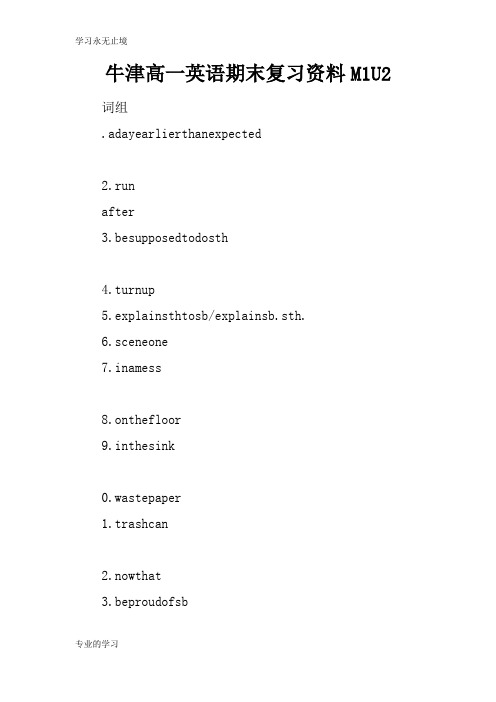
牛津高一英语期末复习资料M1U2 词组.adayearlierthanexpected2.runafter3.besupposedtodosth4.turnup5.explainsthtosb/explainsb.sth.6.sceneone7.inamess8.onthefloor9.inthesink0.wastepaper1.trashcan2.nowthat3.beproudofsb4.stayup5.feelverywell6.doagoodjobin7.beafraidof8.benervousabout9.fornothing20.askforone’sadvice21.advisedoingsth22.advisesbtodosth23.goforawalk24.keep/goondoingsth25.keepinmind26.what’sup?27.getsthtidyup28.either……or29.behardon30.inchargeof31.inthechargeof32.regretdoingsth33.regrettodosth34.mixupwith35.mixwith36.tidyup37.cleanup38.allowdoingsth39.allowsbtodosth/allowsbdosth40.becomeupsetwith41.forbidsbtodosth=forbidone’sdoing42.atthemoment=atpresent43.refusetodosth44.asthough=asif45.insistondoingsth46.missdoingsth47.arguesthwithsb48.bepresent49.preventsbdoing50.betodosth51.thetwoofus52.likecrazy53.dowith=dealwith54.helpsbwithsth55.pullone’sleg/makefunof56.allears57.awetblanket单词拼写:根据所给首字母或中文写出相应单词的正确形式..Amongallthes______________,jacklikeschemistryb est.2.HehadchangedsomuchovertheseyearsthatIdidn’tr____________himatfirst.3.childrenarealwaysc_________aboutnewthingsandtheyw anttoknowmoreaboutthem.4.Timeisv___________andeveryoneofusshouldmakegoodus eofeveryminute.5.Hefeltp___________anddidn’tknowhowtoanswerthequestion.6.youcanfeelbetter,lookbetterandhavemoreenergyifyou eattherightfoodandexercise_____________.7.Thebodiesofthekingsarewell___________(保存)intheEgyptianpyramids.8.InShangri-la,therearevastgrasslands__________thel akes,whichlooklikejewels.9.Thealienstookjustinawaysothattheycoulddo_________ ____onhim.0.Theachievementsofsomeamazingpeoplehaveagreat________onourlivestoday.1.Theclubisfort____________andpeopleintheirearlytwe nties,sothat’swhysomeoldpeoplewouldn’tacceptit.2.I’msorryforwhathedid,buthehasbeenu___________forit.ca nyouexplainit?3.Thechildrenhadana_____________aboutwhatgametoplay ,buttheydidn’treachanagreement.4.jackdisappearedforafewdays,andwhenhecameback,hedi dn’tgiveanye_________ofhisstrangebehavior.5.Nowadays,inordertoincreasesales,someofthenewspape rsmakeupnews,soyoucan’talwayst_________whatthepaperssay.6.Nobodycanescapebeing________whentheydoanythingwro ngtothesociety.7.whodoyouthinkis_________tolookafterthehouse.8.TherearesomesmalldifferencesbetweenAmericanEnglis handBritainEnglish.Forexample,inAmericanEnglish,weo ftensay“on___________”insteadof“onholiday”.9.Thecaraccidentwasnotthedriver’s_________astherewasamansuddenlyrunningacrosstheroa d.20.Tod____________thegoldmedalinthespeechcompetitio nashehadmadesomanyeffortsthatnobodycouldimagine.用适当的介词或副词填空.Itisawaste________moneytobuythatexpensivecoat.2.Theyworked_______crazytogettheplandoneontime.3.motherinsisted_______hersonlearninghowtoplaythepi ano,butherefused.4.Ifparentsoftenshout________theirchildren,theirchi ldrenwon’ttellthemthetruth.5.Agoodidearushed______mymind.6.Thekeyyoulosthasturned______.7.Thechildren’sroomwas______aterriblemess.8.Helookedathisdrawingwithpride,andwasveryproud____ _hissuccess.9.judyisthebeststudentinourclassandoftenhelpsus____ __ourproblem.0.Inthepastinchina,womenwereforbidden_________going toschool.动词填空.Thequestion____________________iswhetherincome taxshouldbeincreased.2.Thewindowwasfound_________________.3.Itissuggestedthattheproject_______________bytheen dofthisyear.4.After____________awayintheforestsolong,hedarednot meetpeople.5.Forthelasttwoyears,he__________ahistorybookoftheA mericancivilwar.6.Thebushfireissaid__________________undercontrolal ready.7.Hi,youtwo,whatareyou____________about?It’stimetohavelessons.8.withlotsoftreesandflowers_________hereandthere,th enewly-builtfactorylooksverybeautiful.9.Thelittleboymademuchprogressinhisstudiesthan_____ _______.0.youcanexpressyourdeepest____________inyourdiary.Exercisesonattributiveclause1.Isthisthefactory______youvisitedtheotherday?A.thatB.wherec.inwhichD.theone2.Isthisfactory____someforeignfriendsvisitedlastFri day?A.thatB.wherec.whichD.theone3.Isthisthefactory_____heworkedtenyearsago?A.thatB.wherec.whichD.theone4.Thewolveshidthemselvesintheplaces______couldn’tbefound.A.thatB.wherec.inwhichD.inthat5.Thefreezingpointisthetemperature__________waterch angesintoice.A.atwhichB.onthatc.inwhichD.ofwhat6.Thereasonis_____heisunabletooperatethemachine.A.becauseB.whyc.thatD.whether7.I’lltellyou___hetoldmelastweek.A.allwhichB.thatc.allthatD.which8.Thattree,__________branchesarealmostbare,isveryold.A.whoseB.ofwhichc.inwhichD.onwhich9.Ihaveboughtthesamedress__________sheiswearing.A.asB.thatc.whichD.what10.we’retalkingaboutthepianoandthepianist___wereintheconc ertweattendedlastnight.A.whichB.whomc.whoD.that11.Anyone__________thisopinionmayspeakout.A.thatagainstsB.thatagainstc.whoisagainstD.whoareag ainst12.Didn’tyouseetheman__________?A.InoddedjustnowB.whomInoddedjustnowc.InoddedtohimjustnowD.Inoddedtojustnow13.Isthereanything__________toyou?A.thatisbelongedB.thatbelongsc.thatbelongD.whichbelongs14.----“Howdoyoulikethebook?”----“It’squitedifferentfrom__Ireadlastmonth.”A.thatB.whichc.theoneD.theonewhat15.mr.Zhanggavethetextbooktoallthepupilsexcept____w hohadalreadytakenthem.A.theonesB.onesc.someD.theothers16.Thetrain__shewastravellingwaslate.A.whichB.wherec.onwhichD.inthat17.It’sthethirdtime__________latethismonth.A.thatyouarrivedB.whenyouarrivedc.thatyou’vearrivedD.whenyou’vearrived18.maythefourthistheday__________wechinesepeoplewil lneverforget.A.whichB.whenc.onwhichD.aboutwhich19.Isitinthatfactory______“RedFlag”carsareproduced?A.inwhichB.wherec.whichD.that20.HemustbefromAfrica,____canbeseenfromhisskin.A.thatB.asc.who21.Hehastwosons,__________workaschemists.A.twoofwhomB.bothofwhomc.bothofwhichD.allofwhom22.I,__________yourgoodfriend,willtrymybesttohelpyo uout.A.whoisB.whoamc.thatisD.whatis23.Idon’tlike__________youspeaktoher.A.thewayB.thewayinthatc.thewaywhichD.thewayofwhich24.Thetwothings______theyfeltveryproudarejim’sgoldwatchandDella’shair.A.aboutwhichB.ofwhichc.inwhichD.forwhich25.Doyouknowwhichhotel__________?A.sheisstayingB.sheisstayinginc.isshestayingD.isshe stayingin26.whocanthinkofasituation________thisidiomcanbeused?A.whichB.thatc.whereD.inthat27.Theastronautdidmanyexperimentsinthespaceship,___ muchhelpforknowingspace.A.whichwethinkitisB.whichwethinkareofc.ofwhichwethinkisD.Ithinkwhichisof28.Thegreatdaywelookedforwardto_____atlasteB.cameinges29.Ilikethesecondfootballmatch_____washeldlastweek.A.whichB.whoc.thatD./30.Thisistheveryfilm___I'velongwishedtosee.A.whichB.thatc.whoD.whom31.Thehouse______thecapitalistusedtoliveinisnowanur sery.A.thatB.wherec.whatD.when32.Thedoctordidall_______tosavethewoundedboy.A.whathecouldB.hecouldc.everythingwhichhecouldD.for whichhecoulddo33._____youknow,heisafamousmusician.A.AsB.whichc.ThatD./34.Heistheonlyoneofthethree______gotthenewidea.A.whohaveB.whomhavec.whohasD.whosehad35.Thisisthebaby______tomorrow.A.afterwhomIshalllookB.whomIshalllookafterc.whoseIshalllookafterD.afterwhomIshalllookafter36.Thesestudentswillgraduatefromtheuniversitynextsu mmer,__theywillhavestudiedhereforfouryears.A.bythenB.bythattimec.bywhattimeD.bywhichtime36.of37.like38.on39.at40.into41.up42.in43.of44.with45.from46.tobediscussed47.broken48.becarriedout49.hiding50.hasbeenwriting51.tohavebeenbrought52.arguing53.built54.expected55.feeling单词拼写56.subjects57.recognize/recognise58.curious59.valuable60.puzzled61.regularly62.preserved63.surrounding64.research65.effect56.teenagers57.unpunished58.argument59.explanation60.trust61.punished62.supposed63.vocation64.fault65.deserved比预料的早一天追赶理应当做某事声音调高向某人解释某事第1幕一片混乱在地板上在水池里废纸垃圾箱既然以某人为荣熬夜身体感觉很好在某方面做的好害怕对……很紧张没有必要/免费的向某人征求意见建议做某事建议某人做某事散步坚持/继续做某事记住怎么了?把……整理好或者……或者对……严厉负责由…负责后悔做了某事遗憾去做某事把…与…在混淆一起使…和…混合收拾干净打扫干净允许做某事允许某人做某事禁止某人做某事对……感到心烦意乱目前拒绝做某事好象坚持要求做某事想念做谋事/未能做成谋事和sb争论sth出席阻止sb做某事将应该做某事我们两个发疯地处理帮助某人某事嘲笑,聚精会神听扫兴的人。
M1U2基本知识点

M1U2基本知识点Module 1 Unit 2 Growing pains 基本知识点教学目标:1. 掌握本单元的基本词汇,包括中英文和词性的转换,能在阅读中读懂文章。
2. 掌握基本短语,包括介词短语,动词短语,常用词的固定搭配。
3. 掌握基本句型,并根据所学句型能够翻译句子。
4. 掌握定语从句的基本用法,知道关系副词的运用,能够做一些简单练习。
一.基本词汇:1.容忍,允许2.行为,句子3.辩解,辩白;防御,保护4.解释,说明(n)5.处理,对付6.坚持,坚持认为7.争吵,辩论,论点,论据8.耐心9.自私的10.疏远的,遥远的11.禁止12.正常的,常规的,一般的13.限制,极限,界限14.独立(n)15.平衡,抵消16.curtain17.frightened18.bend19.starve20.adult21.fault22.emergency23.deserve24.sigh25.error26.guidance27.freedom28.annoyed29.confused30.wisdom教学要求:给定中文的要求学生会读,会写,会用;给定英文的要求学生认识单词,有助于学生词汇量的扩大。
二.词性转换:1.frightened (动词) →__________2.bend (过去式) →__________ (过去分词)→__________3.starve (名词) →__________4.sink (过去式) →__________ (过去分词)→__________5.tolerate (形容词) →__________ (名词)→__________6.behavior (动词) →__________7.emergency (形容词) →__________8.explanation (动词) →__________9.chat (过去式) →__________ (过去分词)→__________ 10.argument (动词) →__________11.freedom (形容词) →__________ (副词)→__________12.harm (动词) →__________ (形容词)→__________13.patience (形容词) →__________ (反义词) →__________14.annoyed (动词) →__________15.forbid (过去式) →__________ (过去分词) →__________16.misunderstand (名词) →__________17.confused (动词) →__________18.limit 动词) →__________ (形容词)→__________20.balance (形容词) →_________19.wisdom (形容词) →__________教学要求:掌握基本词汇的名词,动词,形容词等的词性转换,有助于学生任务型阅读方法和技巧的提高。
上海秋季牛津英语三年级上册三上M1U2同步讲义教案(含词汇语法练习)
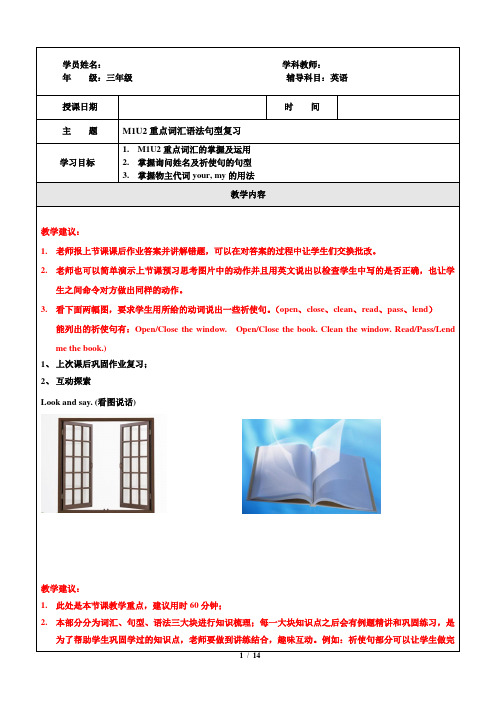
教学建议:1.老师报上节课课后作业答案并讲解错题,可以在对答案的过程中让学生们交换批改。
2.老师也可以简单演示上节课预习思考图片中的动作并且用英文说出以检查学生中写的是否正确,也让学生之间命令对方做出同样的动作。
3.看下面两幅图,要求学生用所给的动词说出一些祈使句。
(open、close、clean、read、pass、lend)能列出的祈使句有:Open/Close the window. Open/Close the book. Clean the window. Read/Pass/Lend me the book.)1、上次课后巩固作业复习;2、互动探索Look and say. (看图说话)教学建议:1.此处是本节课教学重点,建议用时60分钟;2.本部分分为词汇、句型、语法三大块进行知识梳理;每一大块知识点之后会有例题精讲和巩固练习,是为了帮助学生巩固学过的知识点,老师要做到讲练结合,趣味互动。
例如:祈使句部分可以让学生做完题目之后重复句子并且做出相对应的动作。
单词【知识梳理1】open v. 打开(1)打开e. g. Open the window,please.请打开窗户。
Open your mouth and say“Ah!”张开嘴巴,说“啊”![反义词] close关上(1) adj.开着的e. g. The window is open.窗户是开着的。
The door is open.门是开着的。
【知识梳理2】close 动词(1)关;闭e. g. Close the door,please.请关上门。
Please close your books.请合上你们的课本。
(2)不开;关闭e. g. What time does the shop close?商店什么时候关门?[反义词] open打开;开着【知识梳理3】door n. 门e. g.-Open the door,please. 请开门。
3A四会单词汇总
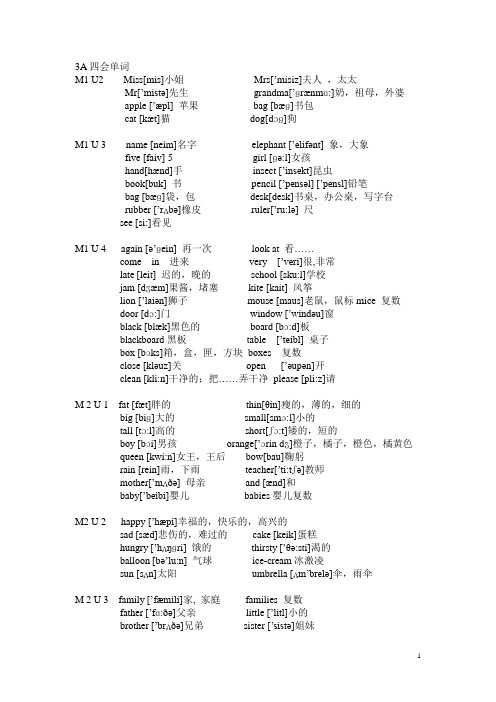
3A四会单词M1 U2 Miss[mis]小姐Mrs[’misiz]夫人,太太Mr[’mistə]先生grandma[’ɡrænmɑ:]奶,祖母,外婆apple [’æpl]苹果bag [bæɡ]书包cat [kæt]猫dog[dɔɡ]狗M1 U 3 name [neim]名字elephant [’elifənt] 象,大象five [faiv] 5 girl [ɡə:l]女孩hand[hænd]手insect [’insekt]昆虫book[buk] 书pencil [’pensəl][’pensl]铅笔bag [bæɡ]袋,包desk[desk]书桌,办公桌,写字台rubber [’rʌbə]橡皮ruler[’ru:lə] 尺see [si:]看见M1 U 4 again [ə’ɡein] 再一次look at 看……come in 进来very [’veri]很,非常late[leit] 迟的,晚的school [sku:l]学校jam [dʒæm]果酱,堵塞kite [kait] 风筝lion [’laiən]狮子mouse [maus]老鼠,鼠标mice 复数door [dɔ:]门window[’windəu]窗black [blæk]黑色的board [bɔ:d]板blackboard黑板table [’teibl]桌子box [bɔks]箱,盒,匣,方块boxes 复数close [kləuz]关open [’əupən]开clean [kli:n]干净的;把……弄干净please [pli:z]请M 2 U 1 fat [fæt]胖的thin[θin]瘦的,薄的,细的big [biɡ]大的small[smɔ:l]小的tall [tɔ:l]高的short[ʃɔ:t]矮的,短的boy [bɔi]男孩orange[’ɔrin dʒ]橙子,橘子,橙色,橘黄色queen [kwi:n]女王,王后bow[bau]鞠躬rain [rein]雨,下雨teacher[’ti:tʃə]教师mother[’mʌðə] 母亲and [ænd]和baby[’beibi]婴儿babies婴儿复数M2 U 2 happy [’hæpi]幸福的,快乐的,高兴的sad[sæd]悲伤的,难过的cake[keik]蛋糕hungry[’hʌŋɡri] 饿的thirsty[’θə:sti]渴的balloon[bə’lu:n]气球ice-cream冰激凌sun [sʌn]太阳umbrella[ʌm’brelə]伞,雨伞M 2 U 3 family[’fæmili]家, 家庭families 复数father[’fɑ:ðə]父亲little [’litl]小的brother[’brʌðə]兄弟sister [’sistə]姐妹long [lɔŋ]长的grandfather[’ɡrænd,fɑ:ðə] 祖父,外祖父friend [frend]朋友grandmother[’ɡrænd,mʌðə]祖母,外祖母play [plei] 玩with[wið]和……一起yellow [’jeləu]黄色的ball[bɔ:l]球rabbit [’ræbit]兔子ear[iə]耳朵tail[teil]尾巴van[væn](有蓬的)货车,行李车X-ray [’eks,rei]X光,X射线zebra[’zi:brə]斑马dad[dæd]爸爸good[ɡud]好的M3 U 1 classroom [’klɑ:sru:m]教室hall[hɔ:l]礼堂toilet [’tɔilit] 厕所,盥洗室,洗手间library[’laibrəri]图书馆(单数)libraries图书馆(复数)office [’ɔfis]办公室playground[’pleiɡraund]操场clap[klæp]拍手wave[weiv]挥动,波浪up [ʌp]向上down[daun]向下chair [tʃɛə]椅子crayon[’kreiən]蜡笔M 3 U 2 fruit [fru:t]果实,水果banana[bə’nɑ:nə]香蕉biscuit [’biskit]饼干pear[pɛə]梨flower [’flauə] 花circle[’sə:kl]圆形square[skwɛə]正方形,广场triangle[’traiæŋɡl]三角形star[stɑ:] 星星,明星shape[ʃeip]形状M3 U 3 red [red]红色的orange[’ɔrin dʒ]橘黄色的,橙色的green [ɡri:n]绿色的blue[blu:]蓝色的black[blæk]黑色的white[wait]白色的sky [skai]天,天空cloud[klaud]云tree [tri:] 树boat[bəut]小船slide[slaid]滑梯swing[swiŋ]秋千point [pɔint]指new[nju:]新的M 4 U1 pig [piɡ]猪bird鸟hen母鸡chick[tʃik]小鸡duck [dʌk] 鸭子animal[’æniməl]动物put on穿上,带上,系上shoe[ʃu:]鞋count [kaunt]数gate[ɡeit]大门find[faind]找到,发现M4 U2 ladybird[leidibə:d]瓢虫fly[flai]飞(动词)苍蝇(名词)bee 蜜蜂butterfly蝴蝶head [hed]头部leg[leɡ]腿body身体plant[plɑ:nt]植物root[ru:t]根leaf叶子(单数)leaves叶子(复数)M 4 U 3 Coke可口可乐chicken[’tʃikin]鸡,鸡肉egg [eɡ]蛋,鸡蛋sandwich[’sænwidʒ]三明治(单数)apple 苹果pie[pai]馅饼,派sweet[swi:t]甜的,糖果camera[’kæmərə]照相机pink [piŋk]粉红色的photograph照片。
M1U2(牛津高中英语一轮复习知识梳理)

M1U2(牛津高中英语一轮复习知识梳理)Module 1 Unit2 高三一轮复习一,单词默写1. (戏剧的)一幕n. _____________________2. 成年人_____________________;3. 过错,错误______________________4. 值得;应该得到、应受(赏罚等) ______________________5. 解释,说明______________________6. 行为,举止_____________________; n._________________7. 争论__________________8. 不高兴的,失望的 ____________________9. 挑战 ________________ ; 10.独立n.______________ 11. 禁止________________ 12.平衡 ______________13. 弯腰,弯曲 ______________ 14. 受惊的,害怕的______________________ 15.挨饿,饿死 v.______________ 16. 容忍,允许 v.______________17.辩解,辩白;防御,保护 v.______________18.处理;应付 v.______________ 19.指导,引导 n.______________ 20.自由 n.______________21.担心的,担忧的 ______________ 22.伤害 v.n.______________ 23.耐心n.______________ 24.愤怒的,生气的 ______________ 25.误解 v.______________【词汇运用】选择上述适当词汇,并用其正确形式完成句子1. the new government’s first c________ is the European debt crisis which is worsening now.2. They got into an __________ about whether they should goby sea or by air.3. She was really u________ about the way her father treated her.4. Since teenagers have difficulty _______ these needs, they oftenquestion who they are and how they fit in society.5. She d________ a medal for teaching those 5-year-olds all day withoutany pay!. 6. He is such a man who is always finding f___________ with other people.7. his parents never let bad ____________ go unpunished, so the boy isloved by everyone here. 8. She’s not __________. She knows I’m playing withher.9. You are late again. You have to give me your ________ and promise notto. 10. Tourists are _________to swim in the river, for the water flows veryswiftly.二、重点词组演练(选择意义合适的词组完成句子): be supposed to at/aboutsth.in a mess force sb. to do sth. deserve sth happen to sb./sth. thanexpectedbe/get angry with sb.frighten sb. into/out of doing sth.have sth done leave…1.He _______________become a scientist but he chose to be a doctor.2. This question _________a further discussion3. Your room is___________.Please tidy it.4. Don’t leave him ___________ (wait) outside in the rain.5. Your bikebroke down. You’d better ______it _________(repair).三、重点句型:1. Eric runs in after it, followed by a big dog, walking very slowly. 我被他的话所打动,于是收下了他的礼物。
上海牛津英语六年级(上)m1u2教师笔记

上海牛津英语六年级(上)M1U2教师笔记一、学习目标1. 理解并能正确朗读单词和短语:- school, new, classroom, teacher, grade, are, in- How are you? I’m fine, thank you.2. 能听懂、理解并会表达以下句子:- How are you? I’m fine, thank you.3. 掌握并能正确使用语法:- How are you? I’m fine.4. 掌握并能正确使用交际用语:- How are you? I’m fine, thank you.二、教学重难点1. 重点:单词、短语、句子、语法及交际用语的学习与运用。
2. 难点:正确使用How are you? I’m fine, thank you.句型进行日常交流。
三、教学准备1. 课件:针对单词、短语、句子、语法及交际用语的PPT,图文并茂,生动有趣。
2. 教具:幻灯片、多媒体播放设备,教师用黑板并准备书写工具。
3. 材料:教材《上海牛津英语六年级(上)》M1U2课文,学生练习册及作业本。
四、教学过程1. 创设情景引入新课,激发学生学习兴趣。
通过课件或故事情节引入,向学生展示新词汇、句型及表达方式。
2. 学生词汇认读练习。
师生互动,学生认读单词、短语及句子,教师及时纠正发音错误。
3. 同学互动练习。
学生之间进行交际练习,学生用How are you?I’m fine, thank you.进行问候交流。
4. 听力训练。
播放录音或实地对话,要求学生听懂并跟读。
5. 句型训练。
教师引导学生进行句型操练,包括肢体语言的配合,使学生更好地掌握句型的使用。
6. 情景模拟练习。
教师设计情景对话,让学生在真实情境中进行问候交流,并引导学生进行角色扮演。
7. 综合训练。
教师布置相关练习作业,包括课本练习、听力练习及口语练习。
8. 课堂小结。
回顾本节课的学习内容,巩固学生对新知识的理解和掌握。
赛课课件牛津英语M1U2Projec

Organize debates on controversial topics related to the lesson's theme. Encourage students to express their opinions and defend thods and techniques
Activate students' prior knowledge
Previewing
Ask students to preview the content of the lesson to
familiarize themselves with the topic and main points.
To enhance students' understanding of British culture, history, and society.
To provide students with opportunities to collaborate and work together in a team.
Course content
01
Case studies of famous British people and events.
02
Activities to enhance students' understanding of British culture and history.
Course content
Teaching strategies
Lecture
Provide a detailed explanation of the topic, covering all main points and concepts. Use visual aids and examples to illustrate points.
3BM1U2 单词表
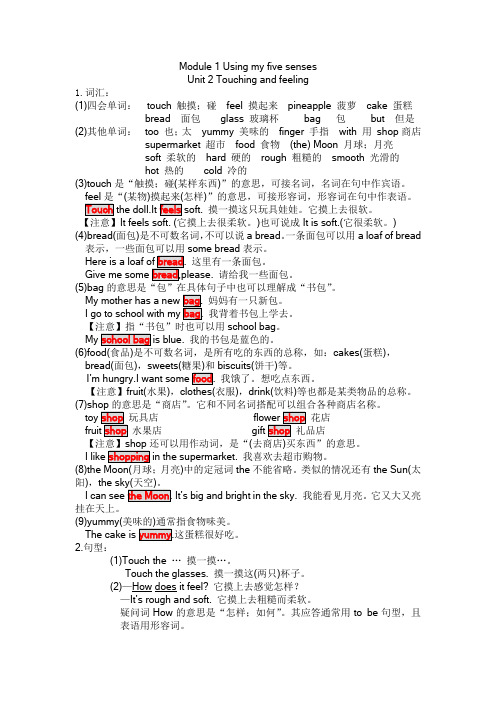
Module 1 Using my five sensesUnit 2 Touching and feeling1.词汇:(1)四会单词:touch 触摸;碰feel 摸起来pineapple 菠萝cake 蛋糕bread 面包glass 玻璃杯bag 包but 但是(2)其他单词:too 也;太yummy 美味的finger 手指with 用shop商店supermarket 超市food 食物(the) Moon 月球;月亮soft 柔软的hard 硬的rough 粗糙的smooth 光滑的hot 热的cold 冷的(3)touch是“触摸;碰(某样东西)”的意思,可接名词,名词在句中作宾语。
(某物))”的意思,可接形容词,形容词在句中作表语。
摸一摸这只玩具娃娃。
它摸上去很软。
)也可说成It is soft.(它很柔软。
) (4)bread(面包)是不可数名词,不可以说a bread。
一条面包可以用a loaf of breadsome bread表示。
这里有一条面包。
请给我一些面包。
(5)bag。
妈妈有一只新包。
我背着书包上学去。
school bag。
我的书包是蓝色的。
cakes(蛋糕),bread(面包),sweets(biscuits(饼干)等。
I’我饿了。
想吃点东西。
【注意】fruit(水果),衣服),drink(饮料)等也都是某类物品的总称。
花店水果店(我喜欢去超市购物。
月亮)中的定冠词the不能省略。
类似的情况还有the Sun(太阳),’s big and bright in the sky. 我能看见月亮。
它又大又亮挂在天上。
(9)yummy(这蛋糕很好吃。
2.句型:(1)Touch the …摸一摸…。
Touch the glasses. 摸一摸这(两只)杯子。
(2)—How does it feel? 它摸上去感觉怎样?—It’s rough and soft. 它摸上去粗糙而柔软。
上海秋季牛津英语四年级上册四上M1U2同步讲义教案(含词汇语法练习)

1.上次课后巩固练习2.预习思考教学建议:1、根据上节课预习思考的要求,让学生对自己所收集到的含有can的英语资料进行分享;2、老师引导学生根据英文歌曲、动画等内容进行分类,从而总结出can的基本用法;(推荐老师分享歌曲I Can Do It以及粉红猪小妹,也可选其中之一,资料见附件)。
【Keys】粉红猪小妹台词:we can’t jump in them./you can play in the paddling pool instead!/Mummy,Daddy!Can George and I have an ice cream ,please?/Please,can I have one as well?/Can I have a cone, please, Ms.Rabbit. /Come on, George You can share Daddy’s ice cream.《I Can Do It(Watch Me Now)》歌词I can do it I can do it I can really make it this time (this time) watch me now.I can make it I can make it I can really take it this time (this time) watch me now.I. Words 单词1.everyone pron. 每人,大家[例句]Everyone knows it.大家都知道这件事。
[记忆链接] everyday adj. 每天的,日常的everything pron.每件事,事事2.paint v. 颜料画画 n.用油漆[例句] He painted this picture.他画了这幅画。
[记忆链接] paint油漆paint brush画笔[常见词组] a tube of paint 一管颜料 a box of paints 一盒颜料 paintbox 颜料盒paintbrush画笔3.draw v. 绘画[例句] He drew some pictures.他画了一些画。
牛津英语四年级教案含练习题_重点语法
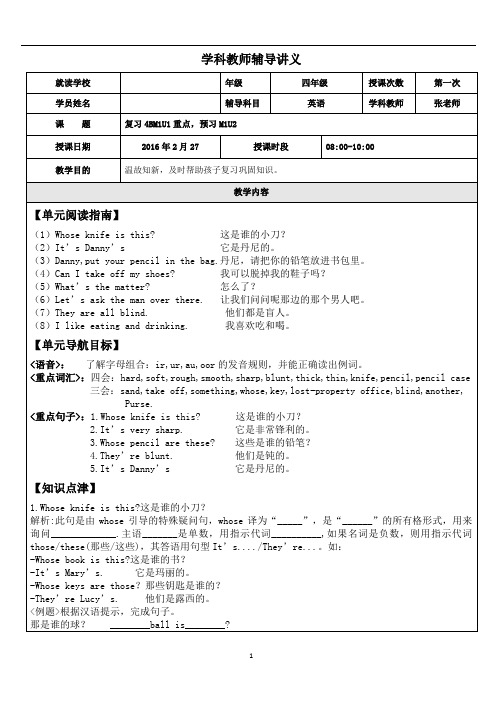
学科教师辅导讲义就读学校年级四年级授课次数第一次学员姓名辅导科目英语学科教师张老师课题复习4BM1U1重点,预习M1U2授课日期2016年2月27 授课时段08:00-10:00教学目的温故知新,及时帮助孩子复习巩固知识。
教学内容【单元阅读指南】(1)Whose knife is this? 这是谁的小刀?(2)It’s Danny’s 它是丹尼的。
(3)Danny,put your pencil in the bag.丹尼,请把你的铅笔放进书包里。
(4)Can I take off my shoes? 我可以脱掉我的鞋子吗?(5)What’s the matter? 怎么了?(6)Let’s ask the man over there. 让我们问问呢那边的那个男人吧。
(7)They are all blind. 他们都是盲人。
(8)I like eating and drinking. 我喜欢吃和喝。
【单元导航目标】<语音>:了解字母组合:ir,ur,au,oor的发音规则,并能正确读出例词。
<重点词汇>:四会:hard,soft,rough,smooth,sharp,blunt,thick,thin,knife,pencil,pencil case 三会:sand,take off,something,whose,key,lost-property office,blind,another, Purse.<重点句子>:1.Whose knife is this? 这是谁的小刀?2.It’s very sharp. 它是非常锋利的。
3.Whose pencil are these? 这些是谁的铅笔?4.They’re blunt. 他们是钝的。
5.It’s Danny’s 它是丹尼的。
【知识点津】1.Whose knife is this?这是谁的小刀?解析:此句是由whose引导的特殊疑问句,whose译为“_____”,是“______”的所有格形式,用来询问_____________.主语_______是单数,用指示代词__________,如果名词是负数,则用指示代词those/these(那些/这些),其答语用句型It’s..../They’re...。
牛津上海版四年级下册M1U2教案
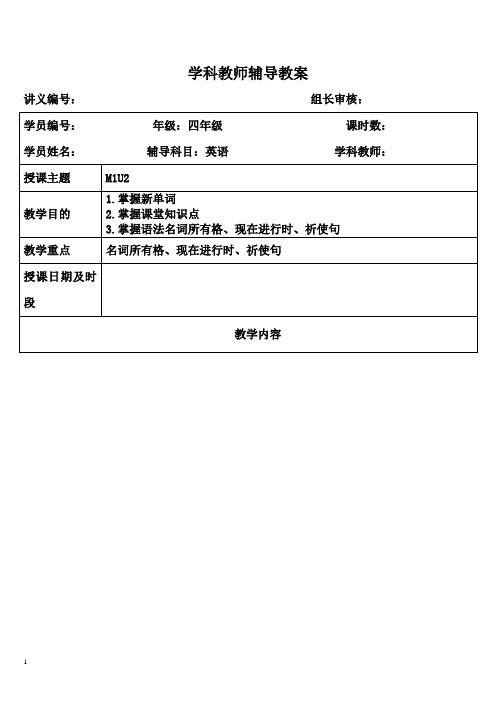
学科教师辅导教案
讲义编号:组长审核:
如:my father's car 我爸爸的车 Children's Day 儿童节
(2)以s或es结尾的复数名词,只在词尾加'。
如:Teachers'Day 教师节
(3)表示两人共有某物时,可以采用A and B's的形式。
注意:如果是A's and B's的形式,则表示两个人各自拥有某物。
如:Lucy and Lily's bedroom露西和莉莉的卧室
Lucy's and Lily's bedrooms露西和莉莉各自的卧室
三.学习play a game部分
Put sth in ...把...放在...里面
Put your pencil in the bag .把你的铅笔放在包里(祈使句,表示命令)
祈使句的概念:
表示请求、命令、建议、祝愿、邀请或要求的句子叫祈使句。
用于祈使句句首的动词总是用原形,不能用其他形式。
如:
Shut the door! 把门关上!
祈使句的主语通常为第二人称(you),但一般都被省略,只有在特殊的情况下才把主语(you)补充出来。
如:
You be quiet! 你安静!
祈使句的否定式:
构成祈使句否定式的方法很简单,那就是在动词原形前加don’t——不管祈使句所用的动词为什么性质动词,情况都是一样。
如:
Open the window. 把窗户打开。
→Don’t open the window. 别把窗户打开。
牛津英语四上M1U2知识点归纳

4A Tips for M1U2Class_______ Name_________ No. ____ Signature_______一、单词/词组二、新句子1. Can Supergirl paint a picture?No, she can’t,but she can run fast.2. I like swimming very much.3. Supergirl and Superdog are both super!4. Can you skip, Danny? No, I can’t.5. Welcome to today’s ‘Super Time’.三、新词解析:1. welcome /ˈwelkəm/(1)to say hello in a friendly way to someone who has just arrived迎接,欢迎〔刚到达的人〕•I must be there to welcome my guests. 我必须在那里迎接我的客人。
•They welcomed us warmly. 他们热烈欢迎我们。
(2) to be glad to accept something 欢迎,乐于接受•We would welcome any advice with open arms. 我们热忱欢迎任何建议。
2. interview /'ɪntəvju:/(1) a formal meeting at which someone is asked questions in order to find out whether they aresuitable for a job, course of study, etc〔求职、入学等的〕面试,面谈•an interview for a job on the Los Angeles Times 《洛杉矶时报》的一次求职面试(2) an occasion when a famous person is asked questions for a newspaper, magazine, televisionprogramme, etc〔对名人的〕采访,访谈•an exclusive interview 独家采访四、语法知识。
- 1、下载文档前请自行甄别文档内容的完整性,平台不提供额外的编辑、内容补充、找答案等附加服务。
- 2、"仅部分预览"的文档,不可在线预览部分如存在完整性等问题,可反馈申请退款(可完整预览的文档不适用该条件!)。
- 3、如文档侵犯您的权益,请联系客服反馈,我们会尽快为您处理(人工客服工作时间:9:00-18:30)。
牛津5AM1U2 背诵内容
一、单词
transport(s)['trænspɔːt] 交通工具
1.taxi(s) ['tæksi] 出租车
2.(an) underground [ˌʌndə'ɡraʊnd] 地下铁同义词:metro/subway/MTR
an underground station 地铁站(['steɪʃn])
traffic rule(s)['træfɪk] [ruːl] 交通规则
3.traffic light(s) [laɪt] 交通灯at traffic lights
4.pavement(s) ['peɪvmənt] 人行道on the pavement
5.zebra crossing(s) ['ziːbrə 'krɒsɪŋ] 斑马线、人行横道线at the zebra crossings
left [left] 左边look left first 先朝左看
(反义词:right右边then look right 后向右看)
6.correct [kə'rekt] 正确的(同义词:right ) That’s right/correct.那是对的。
7.quickly ['kwɪkli] 快地、迅速地(反义词:slowly ) walk quickly 快速走
8.journey ['dʒɜːni] 旅行、旅程
Mr Black’s journey to work 布莱克先生的上班之旅
9.station ['steɪʃn] 站an underground station 地铁站bus stop公交车
at Rainbow Road Station在彩虹路站at Rainbow Road Bus Stop在彩虹公交车站
10.finally ['faɪnəli] 最后、最终(同义词:at last) (同类词:first, second, then …)
11.report [rɪ'pɔːt] 报告give a report to the class 向全班做报告
动词(原形、现在分词、第三人称单数):
12.arrive /ə'raɪv/ 到达(第三人称单数:arrive s) (现在分词:arriv ing)
arrive at school 到达学校arrive in Shanghai 到上海
at表示具体的小的地点、in表示稍微较大的地方
13.leave /liːv/ 离开(第三人称单数:leave s) (现在分词:leav ing)
leave home 离开家
14.cross / krɒs/ 穿过(第三人称单数:cross es) (现在分词:cross ing)
cross the road 过马路
15.wait /weɪt/ 等待(第三人称单数:wait s) (现在分词:wait ing)
wait on the pavement 等在人行道上wait for the green light 等绿灯
wait at traffic light s/zebra crossing s等在交通信号灯/斑马线处
16.walk / wɔːk/ 走路、步行(第三人称单数:walk s) (现在分词:walk ing)
walk from the bus stop to Rainbow Primary School 步行从公交车站到彩虹小学17.get /ɡet/ 得到、达到(第三人称单数:get s) (现在分词:get ting)
get on the bus/train/plane 上车get off the bus/train/plane 下车
get in the car 上车get out of the car 下车
18.stay / steɪ/ 待着(第三人称单数:stay s) (现在分词:stay ing)
stay on the bus/train/plane 在车上待着stay in the car 在车里待着
stay on the bus for about fifteen minutes (/'mɪnɪt /)在车上待了大约15分钟19.take /teɪk/ 乘(第三人称单数:take s) (现在分词:tak ing)
take B us N o.12 / B us N o. T wleve 乘公交12路
词组、句型
1. ride his bike to school= go/come to school by bike骑自行车去学校
2. walk to school = go/come to school on foot步行去学校
3. take an underground/MTR to school
= go/come to school by underground/MTR坐地铁去学校
4. take a bus to school = go/come to school by bus 坐公交车去学校
5. drive a car to work = go/come to work by car开车去上班
6. live near school 住在学校附近
反义live far (away) from school 住在离学校远
7. a teacher at/from Rainbow Primary School 彩虹小学的一名老师
8. live on Green Road 住在格林路
live at No. 456 Green Road 住在格林路456号
9. do a survey 做调查
二、重点语法
*对于方式、方法,何种交通工具进行提问,用How,即:
--How do you and your cousin come to school?
--My cousin and I come to school by bus.
-- How does Peter go to school?
--He walk s to school.
注意第三人称单数的动词表达
*掌握同种交通工具的不同表达法,即:
We take an underground to school. = We go/come to school by underground. My father walks to work. = My father goes to work on foot.
Ben rides a/his bike to school. = Ben goes to school by bike.
My mother drives a car to Puxi. = My mother goes to Puxi by car.
注意动词与交通工具的恰当配对
When is it? It’s on the nineteenth of September.
What’s the date today? It’s the nineteenth of September.
What day is it today? It’s Friday.
*掌握各种介词的准确搭配,详见以上单词列表,或书上固定短语
*How often …? 与How long …? 句型,即:
1. –How often does Jerry do homework? (How often表示“时间的频率”)
--He does homework three times a week. 频率副词回答
2. –How long does Mr Black stay on the bus? (How long 表示时间的持续长度) --He stays on the bus for about fifteen minutes. for引导的时间短语回答
其中How long句型,学有余力的学生可以考虑掌握。
